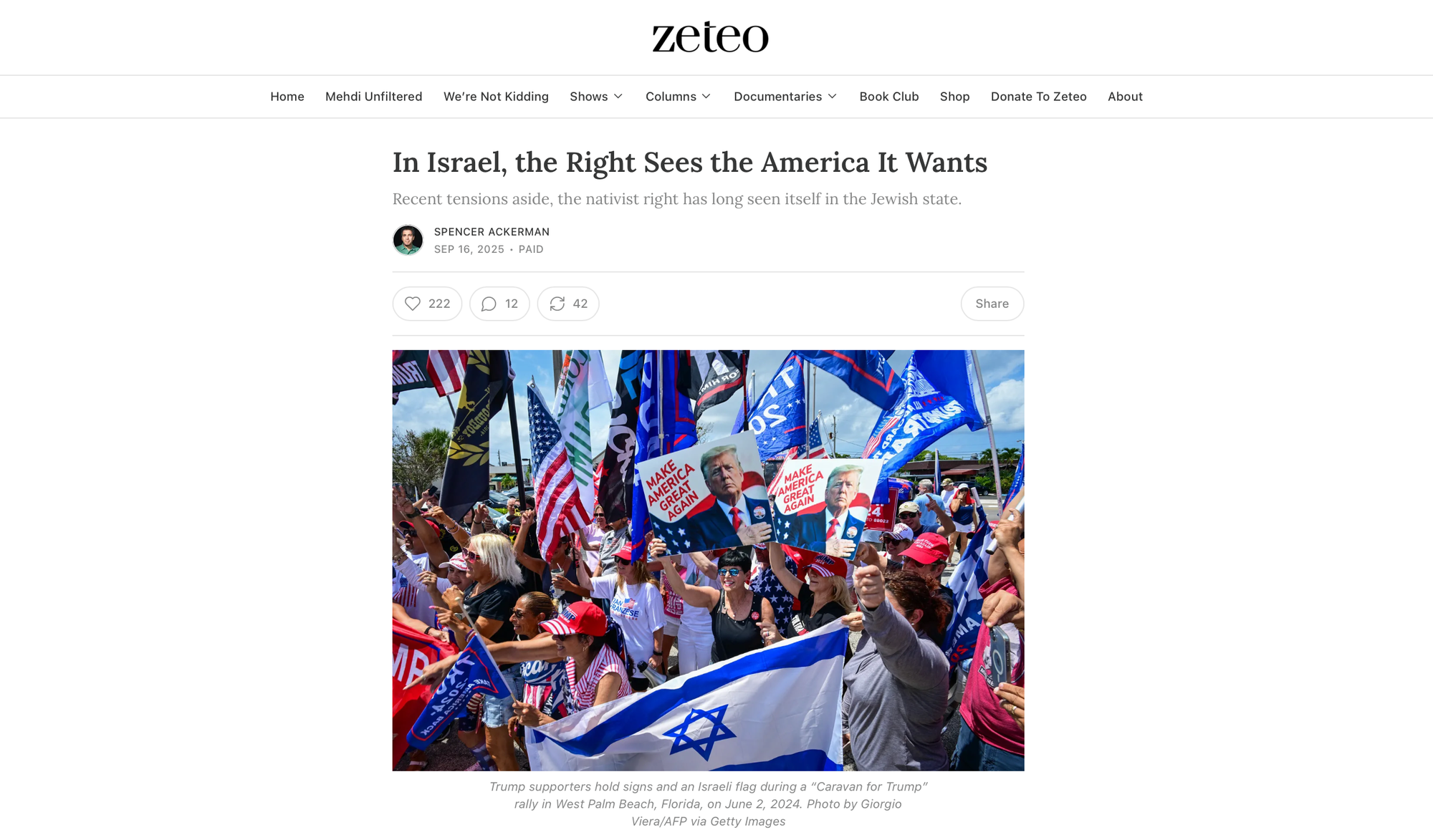In Israel, the Right Sees the America It Wants (Director's Cut)
Recent tensions aside, the nativist right has long seen itself in the Jewish state

Recent tensions aside, the nativist right has long seen itself in the Jewish state
Edited by Zeteo, except for the intro part that Sam Thielman edited
IF THIS ONE seems like it comes out of nowhere, that's because so much news happened over the past two weeks that Zeteo was compelled to hold this for a bit. It was initially pegged to comments Benjamin Netanyahu made at the end of August that spoke to the relationship between Israel and the MAGA coalition. No one likes having their pieces held, but it's a reality of this business, and I can understand Zeteo's position given everything that happened, particularly with Israel bombing Doha and the Charlie Kirk slaying.
Perhaps the timing of the piece's eventual publication worked out. This week, a United Nations panel concluded—yes, after two years, long after Palestinians pleaded for the world to stop their slaughter—that Israel is committing genocide. (Watch Mehdi Hasan interview two of the panel's commissioners.) As I write in the piece below, the Israeli government considers U.N. condemnation a badge of honor, and earlier this week hinted at "unilateral decisions" it will take to impose consequences on states that recognize Palestine. But the biggest consequences Israel of course reserves for Palestinians. We are watching the IDF destroy Gaza City, expel its already-much-displaced population, and, in the West Bank, fascist settler and Finance Minister Bezalel Smotrich seeks to "bury" any prospect of a Palestinian state.
Meanwhile, here in the United States, much of the right is expressing a post-Kirk bloodlust. While we don't know if it's related, this week Demartravion "Trey" Reed, a 21-year old Grenadian student at Mississippi's Delta State University, was found hanged from a tree, which police suspiciously called a suicide.
The European Union is considering sanctions on Israel, although al-Jazeera reports that the measures don't have the votes for passage. Still, Netanyahu this week made comments warning of a dawning "autarkic economy" that will be the result of what he expects to be a sustained period of international isolation. I first encountered Netanyahu's comments from an excellent John Ganz column. It so happens that I'm reading the forthcoming Capitalism: A Global History by Sven Beckert and have arrived at the 1930s, the classic autarkic economic era, one in which trading blocs reflecting a volatile great-power competition contributed to a global devastation. So I had that swirling around in my mind.
Netanyahu says Israel is "not part of any bloc," which is an interesting thing to hear from a premiere client of the United States that, at the time of Netanyahu's address, was hosting U.S. Secretary of State Marco Rubio. It struck me as a recognition that U.S. geoeconomic decline is either imminent or has begun, which is debatable, but also that Israel will find no substitute patron in the era after U.S. primacy. Israel has nothing politically, economically or culturally to offer China that would compel Beijing to extend the same free hand that Washington does. That really ought to be a reminder of the overwhelming leverage the U.S. possesses over Israel that leaders in both parties refuse to use. Few will lose as much in a post-American era as Israel will.
Netanyahu noted, correctly, that Israel does have a "technological and scientific advantage"—he means its military-derived surveillance industry—"that creates dependence on us and gives others an interest in maintaining ties with us." But those interests are weaker for the similarly-advantaged Chinese than it is for, say, the Abraham Accords countries in the Gulf and northwest Africa—who have just watched in horror as Israel bombed neutral Qatar. If the history recounted in Beckert's book is any guide, Israel is incentivized in such an era to seek regional hegemony and resource dominance in areas it can conquer or suborn. That's a formula for pursuing a Greater Israel that does not stop at Palestine. Or, "Super-Sparta," as Netanyahu called it, before he had to walk his comments back after markets dove and union leaders rejected a future defined by permanent war instead of peace.
And with that, the column, for paid subscribers, after the paywall.

